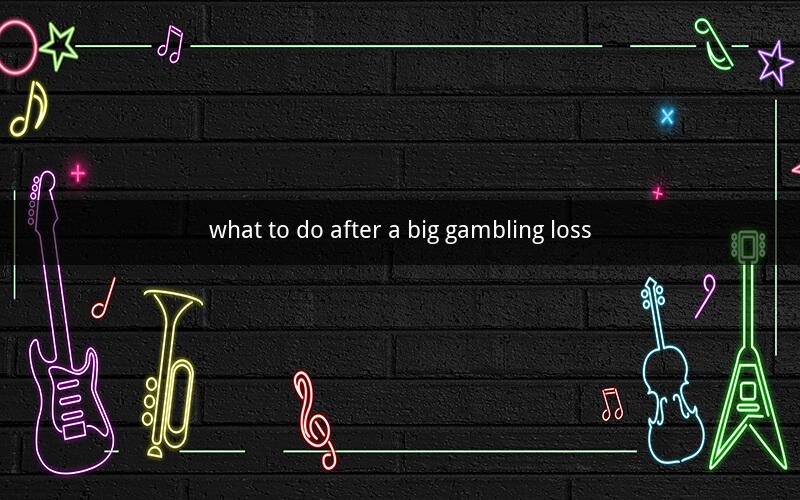
Directory
1. Understanding the Emotional Impact of a Big Gambling Loss
2. Immediate Actions to Take After a Loss
3. Seeking Support and Counseling
4. Analyzing the Loss and Identifying Triggers
5. Developing a Recovery Plan
6. Financial Management and Budgeting
7. Avoiding Future Gambling Temptations
8. Legal and Ethical Considerations
9. Learning from the Experience
10. Moving Forward and Building Resilience
1. Understanding the Emotional Impact of a Big Gambling Loss
Experiencing a significant loss in gambling can be a devastating event. It often leads to a range of emotional responses, including shock, denial, guilt, and depression. Understanding these emotions is crucial for the recovery process.
2. Immediate Actions to Take After a Loss
The first steps after a big gambling loss are essential in preventing further harm. These actions include:
- Take a Break: Give yourself time to process the loss and its implications.
- Seek Support: Reach out to friends, family, or a professional for emotional support.
- Avoid Making Impulse Decisions: Refrain from gambling immediately after a loss to prevent impulsive behavior.
3. Seeking Support and Counseling
Seeking professional help is a vital step in overcoming a gambling loss. Therapists, counselors, and support groups can provide the necessary tools and strategies for recovery.
4. Analyzing the Loss and Identifying Triggers
Understanding why the loss occurred is crucial for preventing future mistakes. Analyze the situation, identify triggers, and learn from the experience.
5. Developing a Recovery Plan
A tailored recovery plan can help you regain control over your life. This plan may include:
- Setting Goals: Establish clear, achievable goals for your recovery.
- Creating a Routine: Develop a daily routine that promotes stability and reduces the temptation to gamble.
- Monitoring Progress: Regularly assess your progress and adjust your plan as needed.
6. Financial Management and Budgeting
Addressing the financial aspect of a gambling loss is critical. Implement the following strategies:
- Create a Budget: Establish a realistic budget that accounts for all your expenses.
- Seek Financial Counseling: Consider consulting with a financial advisor to help manage your finances.
- Pay Off Debts: Prioritize paying off any debts incurred from gambling.
7. Avoiding Future Gambling Temptations
To prevent future losses, it's essential to avoid triggers and tempting situations:
- Stay Away from Casinos and Betting Sites: Limit your exposure to gambling environments.
- Use Blocking Software: Install software that blocks access to gambling websites.
- Find Alternative Activities: Engage in hobbies and activities that do not involve gambling.
8. Legal and Ethical Considerations
If your gambling loss has led to legal or ethical issues, it's important to address them promptly:
- Consult with a Lawyer: Seek legal advice if you face legal consequences from your gambling.
- Adhere to Ethical Standards: Reflect on your actions and consider how they may have affected others.
9. Learning from the Experience
Embrace the opportunity to learn from your mistakes. Use the experience as a catalyst for personal growth and development.
10. Moving Forward and Building Resilience
Focus on building resilience and moving forward:
- Practice Self-Compassion: Be kind to yourself during the recovery process.
- Celebrate Small Wins: Acknowledge and celebrate your progress, no matter how small.
- Seek Inspiration: Look to others who have overcome similar challenges for motivation.
---
Questions and Answers
1. Q: How can I cope with the emotional impact of a big gambling loss?
A: Seek support from friends, family, or professionals, and engage in activities that promote emotional well-being.
2. Q: What immediate actions should I take after a gambling loss?
A: Take a break, seek support, and avoid making impulsive decisions.
3. Q: Is it necessary to seek professional help after a gambling loss?
A: Yes, professional help can provide valuable tools and strategies for recovery.
4. Q: How can I analyze my gambling loss to prevent future mistakes?
A: Reflect on the situation, identify triggers, and learn from the experience.
5. Q: What financial management strategies can help me recover from a gambling loss?
A: Create a budget, seek financial counseling, and prioritize paying off debts.
6. Q: How can I avoid future gambling temptations?
A: Stay away from gambling environments, use blocking software, and find alternative activities.
7. Q: What legal and ethical considerations should I be aware of after a gambling loss?
A: Consult with a lawyer if facing legal consequences and adhere to ethical standards.
8. Q: How can I build resilience after a gambling loss?
A: Practice self-compassion, celebrate small wins, and seek inspiration from others.
9. Q: What are some alternative activities to gambling that can help me recover?
A: Engage in hobbies, exercise, and socialize with non-gambling friends and family.
10. Q: How can I maintain my recovery progress over time?
A: Regularly assess your progress, adjust your plan as needed, and stay committed to your goals.